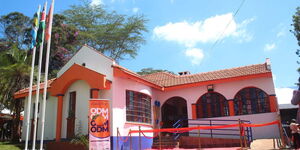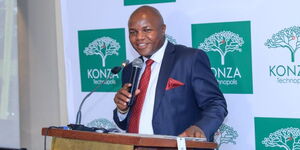Attorney General Dorcas Oduor has appointed award-winning singer and songwriter Dan Aceda, Sarah Wanjiru Migwi, and Agatha Lutala Karani as members of the board of directors of the Kenya Copyright Board (KECOBO).
Through a gazette notice, the AG revealed the new development, stating the three will serve for a three-year tenure at the embattled government body.
“In exercise of the powers conferred by section 6 of the Copyright Act, the Attorney-General appoints— Agatha Lutala Karani, Sarah Wanjiru Migwi, Dan Okoth Aceda, to be Members of the Board of Directors of the Kenya Copyright Board, for a period of three (3) years, with effect from the 25th April, 2025,” the notice stated.
Aceda is a bigwig in the local and regional musical scene and is renowned for his fusion of R&B, neo-soul, and Benga music. He is also a successful entrepreneur with SemaBOX Africa and has extensively worked in film and other niche creative areas.
However, his appointment and that of the two others come at a time when KECOBO has been at the centre of a significant controversy involving the management and distribution of royalties to Kenyan artists.
The institution faced allegations of mismanagement and withholding of royalties amounting to hundreds of millions and has also been accused of interfering with the running of Collective Management Organisations (CMOs) in the country.
MCSK accused KECOBO of withholding Ksh300 million in royalties meant for musicians. They alleged that KECOBO had diverted these funds into a government-controlled account and was unjustly retaining 30 per cent of the proceeds, despite not being a CMO or representing any musicians.
In April 2024, the High Court barred KECOBO from renewing the licenses of three major Collective Management Organisations (CMOs): the Music Copyright Society of Kenya (MCSK), PRISK, and the Kenya Association of Music Producers (KAMP). This decision came after petitioners raised issues about the renewal process and the operations of these CMOs .
Following the suspension of the three CMOs, KECOBO granted a one-year license to the Performing and Audio-Visual Rights Society of Kenya (PAVRISK), formerly PRISK, to act as the sole organisation responsible for collecting and distributing royalties to artists.
However, the decision to license PAVRISK exclusively was met with legal challenges. In September 2024, a court ruling declared KECOBO's appointment of PAVRISK as the sole CMO null and void, citing procedural issues.
Subsequently, in April this year, the court directed KECOBO to issue interim six-month operating licenses to MCSK, KAMP, and PRISK under a joint licensing regime, restoring their roles in royalty collection.
During that period, the CMOs would be required to meet a series of conditions designed to enhance transparency and compliance.
Under the conditions, KECOBO and the CMOs must jointly carry out a comprehensive verification and validation of CMO membership and music catalogues within two months. The results of this process are expected to be made public. The CMOs must also collect royalties in a transparent and coordinated manner and are required to collaborate on the development of joint tariff structures for the upcoming tariff year, in line with the Copyright Act and Regulations.
Furthermore, all three CMOs must account for royalties collected between 4 June 2024 and 4 April 2025. A detailed distribution plan must be submitted to KECOBO, adhering to the 70/30 distribution rule, which stipulates that a minimum of 70 per cent of collected royalties must be distributed to rights holders. Evidence of compliance with this rule must be provided within three months of the licence issuance.
KECOBO indicated that adherence to these terms will influence future licensing decisions as stipulated under the Copyright Act and its accompanying regulations.












